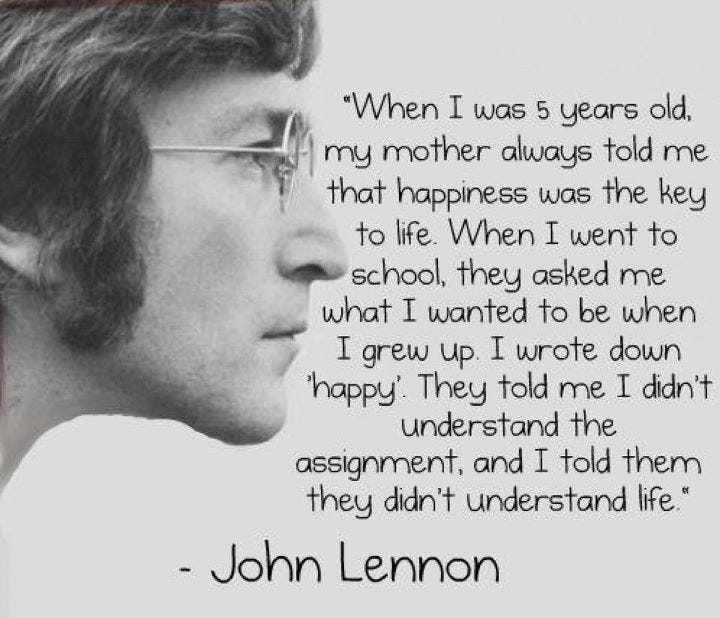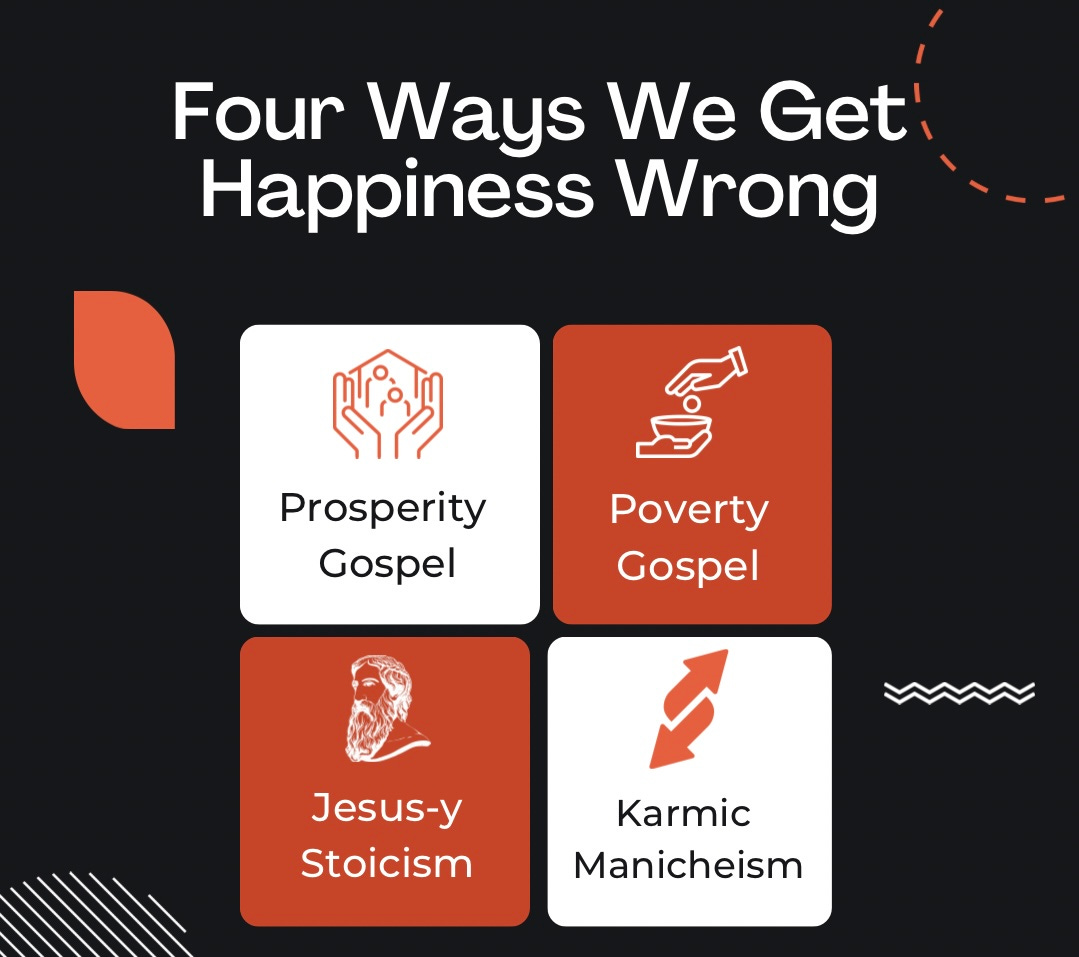What We Get Wrong About Happiness
Four Ways We Get Happiness Wrong and Why It Matters
1. Lennon Apocrypha
There’s this one John Lennon anecdote splattered all over social media that I’m 97% sure is apocryphal. As it goes, Lennon’s kindergarten teacher asked his class to write down what they wanted to be when they grew up. But rather than “astronaut” or “globe-trotting musician,” Lennon wrote “happy.” The teacher told Lennon that he didn’t understand the assignment, and Lennon told the teacher she didn’t understand life.
While it’s probably a bit too on the nose to be true, what is true is that, if Lennon actually did have this outlook, he would’ve significantly decreased his chances of happiness.
2. Everyone Pursues Happiness
“All men seek happiness. This is without exception. Whatever different means they employ, they all tend to this end. The cause of some going to war and of others avoiding it, is the same desire in both, attended with different views. The will never takes the least step but to this object. This is the motive of every action of every man, even of those who hang themselves.” — Blaise Pascal1
Everyone wants to be happy.
There are few things a room of academics would agree on, but this is probably one of them: humans base most of their decisions around whatever will maximize their happiness.
Plato, Augustine, Bentham, Aquinas, Franklin, Mill, Freud, Foucault, Dawkins and countless others agreed: the pursuit of happiness is our basic instinct.2
Yet despite this instinct, happiness has been on the decline for 12 years, and in 2024, hit its lowest point ever.3
So then comes a follow-up question: what makes us happy?
Some will say marriage,4 healthy eating, exercise, meditation, a fulfilling job. Others might say sex, power, wealth, respect.
And then comes the real problem: why, despite how many of these things we do or obtain, are we still so collectively unhappy?
It’s likely because, despite how many choices we make to increase our happiness, we’re God-awful at judging which decisions actually make us happy.
In other words, unhappiness might be hitting a fever pitch because we’re pursuing happiness in all the wrong ways.
And according to the stats, Christians don’t do much better in the happiness arena than other demographics.5
So, I did some research and came up with four main mistakes we make when pursuing happiness. Even though the subjects in focus are Christian, the general principles are pretty universal.
3. Four Ways We Get Happiness Wrong
1. The Prosperity Gospel
a. Life on earth is all about upward social mobility. You go to church, pray, read Scripture because God will reward you with possessions, financial blessings, promotions, and all-inclusive vacations.
b. Happiness comes from designing earth to look like heaven; not God’s heaven, but your own sort of heaven that’s all about health, wealth, and social climbing.
c. This belief pops up in neo-Pentecostal, health-and-wealth, and megachurch strains of Christianity (and, for whatever reason, lots of Christian talk radio and low budget TV).6
d. The angle of truth is that God does desire to bless you (2 Cor.9:8-12;Matt. 7:6-7).
e. The problem is that “blessing” doesn’t usually have much to do with upscaling our socio-economic status. And for the most part, more wealth doesn’t guarantee more happiness.7
2. The Poverty Gospel
a. Life on earth is about resisting earthly goods that might separate you from God’s blessing. God rewards your poverty in this life with treasures in the next.
b. Happiness is a selfish goal. Any Christian who chases it probably isn’t a real Christian.
c. This belief pops up in fundamentalist, conservative, and sometimes Calvinist church models (and the film Footloose).
d. The angle of truth is that our happiness doesn’t depend on health, wealth, or gratification in our present life (Phil. 4:11-13).
e. The problem is that condemning every earthly pleasure is Biblically unnecessary and, in extreme cases, self-abusive.
3. Jesus-y Stoicism
a. Life on earth is about being carried with the flow of the world around us, disciplining our desires, and acquiring inner virtues.
b. Happiness comes from letting go of fears, hopes, or expectations. Self-control is the way to the good life. If things like anger, jealously, or envy bubble up within you, they must be depleted to achieve contentment.8
c. This belief pops up in the modern spiritual formation, neo-monastic movement, as well as some strains of Eastern Christianity.9
d. The angle of truth is that self-control is a fruit of the spirit and disciplining our desires is healthy.
e. The problem is that muting all pessimistic or optimistic emotions isn’t necessary. When Jesus felt abandoned, He wept (Matt 26); when He felt angry, He ranted (Matt 23); when the situation called for it, He celebrated (John 2). He didn’t keep a buffer between Himself and His emotions; He felt them as intensely as they came to Him.10
4. Karmic Manichaeism11
a. Life on earth is a battle between good and evil. Therefore, the way to blessing is through doing more good than bad. Every action has an equal opposite Divine reaction.
b. Happiness comes from being a “good guy” who does good things. If you sin, don’t be surprised if your life starts looking terrible.
c. This belief pops up in no demographic in particular. Yet, it seems to tend toward people who are either very young in their theological education or never received a solid grasp to begin with.
d. The angle of truth that God does want to bless righteousness (Ps. 5:12) and punish wickedness (Rom. 1:18-32).
e. The problem is that falling short of perfection is inevitable and no human is just good or just evil. While pursuing good does put us in congruence with God’s vision for both our lives and human flourishing, this doesn’t exempt us from pain, sadness, or suffering. The universe is far more complex than karma can account for.
All four of these approaches have bits of truth. But they all fall flat in their own unique ways.
And I think it’s crucial for us to understand why they fail.
Personally, I used to be more in the poverty gospel camp – thinking happiness was a lame side quest only cultural Christians or the un-sanctified chase after.
But now I’m getting more convinced that there’s no getting around the fact that Christians should be happy.
4. Christian Happiness
If our worldview is accurate, we technically have more reasons to be happy than any other demographic.
As C.S. Lewis said, “It is a Christian duty, as you know, for everyone to be as happy as he can.”12
It makes intuitive sense. Jesus came to give us “life to the full” (John 10:10) and later promised that His joy would be in us and that it would be “full” (John 15:11) – or πληρωθῇ, meaning “fulfilled” or “complete.”
There’s plenty other imperatives toward optimism in the New Testament: “Your sorrow will turn into joy” (John 16:20), “Rejoice! Again I will say rejoice” (Phil. 4:4), “Rejoice always” (1 Thess. 5:16).
So, even though “happiness” probably isn’t the highest goal, it is still technically a goal.
Which raises the same question from earlier: how do we become happy?
There's no direct formula for infinite happiness. The Bible doesn't give us a manual, psychologists don't agree on a pathway, and Silicon Valley can't crack the code.
But we do have a lot of pointers.
For one, we know that treating happiness as just another stop on our regularly scheduled emotional cycle can make us unhappy.
As a team of psychologists led by Iris Mauss surmised, a lot of discontent arises when happiness is treated as a norm rather than an exception.13
Humans are not naturally happy. Follow a person for a week and you’ll see that the moments of pure happiness only make up a small fraction of another small fraction.
Which is why writer Randy Alcorn said, “Anyone who waits for happiness will never be happy.”14
Even further, the more directly we pursue happiness, the less likely we are to find it. As I pointed out in the intro, if John Lennon’s highest goal was really happiness, he would’ve kept happiness forever at arm’s length.
Think about it like this. No one graduates high school and thinks “time to pursue depression!” If anything, they set off in search of its direct opposite. And yet, many of them invariably become depressed.
Similarly, Augustine observed, “How does anyone suffer an unhappy life by his will, since absolutely no one wills to live unhappily?”15
He’s got a point. Why is it that so many people who want to live laugh love, often don’t live, nor laugh, nor love?
It seems like it’s because the more we crave happiness, the further we drift from it.
This happens, in large part, because happiness is an idol.
And the pursuit, worship, or hallowing of any idol – be it material, monetary, romantic, or power-related – inevitably leads to disappointment and confusion over where to find lasting joy.
Philosopher James K.A. Smith describes the discontent of someone caught in idol worship, “They’re unhappy, not because they choose to be but because their will is in such a condition that it can’t choose what would ultimately make them happy.”16
No idol, even an idol of personal happiness, is strong enough to sustain human contentment.
It’s just a frustrating part of human nature. As a number of studies and many of the wisest thinkers in history have suggested, happiness can’t be the main goal.17
I mean, it can be; but that’ll minimize our chances of finding it.
Happiness only seems to come as a side effect of pursuing higher values. As comedian Trevor Noah described it, happiness is less a goal than a “frequency that you hit as a welcome coincidence to other things that you might have been doing.”18
So, in this sense, maybe the way to find lasting happiness is to care about it less.
Like the French Carmelite Saint Thérése said, true contentment comes when “we leave God free to act in His way. He is infinitely more capable of rendering us happy than we ourselves are, because He knows us and loves us more than we can ever know or love ourselves.”19
A total, non-anxious trust in God might be the best antidote for unhappiness.
Conversely, incessant attempts to control our circumstances – to conjure our own happiness by our own judgments – pushes us into what Christian activist Parker Palmer called “functional atheism.”
This is when we go through the motions of Christian faith (i.e., prayer, worship, solidarity with scripture) while “believing, on the contrary, that nothing good is going to happen unless we make it happen.”20
Functional atheism is just another way to title the state of not trusting that what God wants for us is for our best. It’s basically Ignatius of Loyola’s idea about the nature of sin: “Sin is unwillingness to trust that what God wants for us is only our deepest happiness.”21
I think he’s spot on. If worshipping idols – aka, getting caught up in a sin spiral – is the root of discontent, then separating ourselves from idols through merging our wills with God’s might be the bedrock of lasting happiness. Like Father Zosima said in Brothers Karamazov, “Anybody who is completely happy can be sure he’s doing God’s will on earth.”22
While life rarely works as neatly as a formula, perhaps our willingness to honor God’s will above our own is a simple equation for producing lasting contentment.
All of which essentially boils down to our ability to abide by the simple paradigm Jesus laid out 2,000 years ago: “Whoever seeks to preserve his life will lose it, but whoever loses his life for my sake will find it” (Luke 9:24-25).
Blaise Pascal, Pensees, ed. W. F. Trotter (1660; New York: Dutton, 1908), 34.
See Daniel Gilbert, Stumbling on Happiness (New York: Vintage, 2008), 33-36.
Ivana Saric, “U.S. Hits New Low in World Happiness Report,” Axios, March 19, 2024, https://www.axios.com/2024/03/20/world-happiness-america-low-list-countries#.
Brad Wilcox, Get Married: Why Americans Must Defy the Elites, Forge Strong Families, and Save Civilization (New York: Broadside Books, 2024).
They still do better, just not much better. See Joey Marshall, “Are Religious People Happier, Healthier? Our New Global Study Examines This Question,” Pew Research, January 31, 2019, https://www.pewresearch.org/short-reads/2019/01/31/are-religious-people-happier-healthier-our-new-global-study-explores-this-question/.
Increasingly, I’m also noticing this in theologically liberal circles, where bettering the material or social aspirations for society is the entire focal point of their mission, thus inadvertently making environmental improvements the most noble goal.
Andrew T. Jebb, Louis Tay, Ed Diener, & Shigehiro Oishi, “Happiness, Income Satiation and Turning Points Around the World,” Nature Human Behaviour 2 no. 1 (2018): 33-38.
See Bertrand Russell, A History of Western Philosophy (New York: Simon & Schuster, 1967), 264.
Although, I definitely believe this to a be a misunderstanding of the spiritual formation movement. See here.
My good friend and scholar Ben Doyle told me that I needed to add a footnote explaining that this is a gross oversimplification of stoicism that more accurately reflects an outsider’s perspective of what stoicism really is.
Manichaeism is a philosophical/religious system popularized in 3rd century Persia that saw the universe as a conflict between light and darkness – aka, super dualistic.
Quoted in Sheldon Vanauken, A Severe Mercy: A Story of Faith, Family, and Triumph (New York: HarperOne, 2011), 189.
Iris B. Mauss, et al., “Can Seeking Happiness Make People Unhappy? Paradoxical Effects of Valuing Happiness,” Emotion 11, no. 4 (August 2011): 807-815; Lauren Sharkey, “The Surprising Link between Depression and the Pursuit of Happiness,” Medical News Today, January 16, 2020, www.medicalnewstoday.com/articles/327493.
Randy Alcorn, Happiness (Carol Stream, IL: Tyndale, 2015).
Augustine, On the Free Choice of the Will 1.14.30, in On the Choice of the Will, On Grace and Free Choice, and Other Writings, ed. and trans. Peter King (Cambridge: Cambridge University Press, 2010), 25.
James K. A. Smith, On the Road with Saint Augustine (Grand Rapids, MI: Brazos Press, 2019), 69.
Felicia K. Zerwas & Brett Q. Ford, “The Paradox of Pursuing Happiness,” Current Opinion in Behavioral Sciences 39 (2021): 106-112.
Adam Grant & Trevor Noah, “Trevor Noah on the importance of context,” WorkLife with Adam Grant, Aug 27, 2024.
Jacques Philippe, Searching for a Maintaining Peace: A Small Treatise on Peace of Heart (Staten Island, NY: Alba House, 2002), 37.
Parker Palmer, Let Your Life Speak: Listening for the Voice of Vocation (San Francisco, CA: Jossey-Bass, 2000), 64.
Ignatius of Loyola says this somewhere in Spiritual Exercises (at least, I’m almost positive).
Fyodor Dostoyevsky, The Brothers Karamazov (New York: Penguin Classics, 2001).







Thanks Griffin, a great essay. I was especially struck by 'personal happiness as an idol', as it explains my discomfort at the amount of prayers I hear by people for things that they want to happen. Even if they are very good things (according to my analysis of good and bad), I wish there was more praying for God's will to be done in our lives, not for the statisfaction of our happiness. What do you think, am I off on the wrong track?
I have also spent a good amount of time dwelling on the difference between what we call 'happiness' and 'joy' and 'contentment'. The connotation of words changes over time, and I feel like happiness seems quite fleeting and emotional compared with those who are content and/or joyful.
I appreciate this compilation of thoughts on happiness. I'm in an extended season where a lot of people in my life need a lot of ... me. It is easy to feel overwhelmed and sometimes resentful. BUT! Here's what I've been noticing ... and your post sheds some light on the reason for it: When I sit with my calendar and think about all of the disparate tasks and responsibilities I need to fit into a given day/week, I get anxious and frustrated. However, when I'm actually with the person I'm serving/helping, actually doing the work and/or being fully present, I'm generally happy -- I feel like I'm in the zone. Or we could call it being blessed. To your point, pursuing happiness gets me nowhere, but by doing what I feel I'm called to do, happiness and contentment settle in around me.